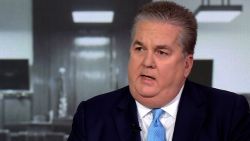Editor’s Note: Elie Honig, a former federal and state prosecutor, is a CNN legal analyst and a Rutgers University scholar. The opinions expressed in this commentary belong to the author. View more opinions at CNN.
Friday’s Court of Appeals decision permitting former White House counsel Don McGahn to ignore a congressional subpoena is a constitutional earthquake. If the ruling – by two judges, with a third dissenting – stands, the McGahn decision will fundamentally shift the ground beneath our system of checks and balances. It will tilt the legal terrain against Congress in favor of not just the Trump administration (for now), but the presidency itself.

The fact that McGahn – according to special counsel Robert Mueller, a direct witness to acts that met the requirements to bring obstruction charges against President Donald Trump – will not testify is actually the less important story here. (Trump has denied any wrongdoing.) As a refresher: in 2017, Trump asked McGahn to have Mueller fired, and then later asked McGahn to lie and deny that Trump had made the previous request of him. Any non-president would have been indicted for this conduct. Seems like a relevant point for Congress to investigate, but alas, the United States Court of Appeals for the District of Columbia Circuit has let McGahn and the White House off the hook (again: for now, at least).
The even bigger story here is that the McGahn ruling essentially guts Congress’s ability to conduct oversight of the executive branch, now and in the future. After the Mueller report came out, the House Judiciary Committee subpoenaed McGahn for his testimony. The White House, however, invoked a doctrine of “absolute immunity,” claiming that it had the absolute right to instruct executive branch officials to simply ignore any congressional subpoena, anytime, for any reason.
A federal district court judge promptly gave the White House’s absolute immunity claim the legal smackdown it deserved. The judge ruled that McGahn must comply with the subpoena, and dismissed the White House’s argument as “a fiction” that gets the concept of constitutional separation of powers “exactly backwards.” The judge noted, “Presidents are not kings. ”
In overturning the district court judge, the Court of Appeals actually did not so much rule as cop out. The Court of Appeals did not even consider whether this notion of “absolute immunity” holds any legal legitimacy. Instead, the Court of Appeals whimpers that the case “asks us to settle a dispute that we have no authority to resolve,” and huffs that the dispute is “unfit for judicial resolution.” Translation: Congress and the White House, you can duke this out, and we’ll just stay over here, out of harm’s way.
Let’s be clear about what this case means, if it stands: Congress no longer holds any meaningful subpoena power towards the executive branch. Anytime the White House (or the Justice Department, or the State Department, or any other executive branch agency) receives a subpoena from Congress, the executive branch agency can laugh, put the subpoena in a shredder, and toss the tiny pieces into the garbage. And the courts, following the lead of the McGahn Court of Appeals, will shrug and say, “Hey, nothing we can do.”
So, what happens next? Rep. Jerry Nadler has already stated that the House will seek “en banc” review, in which the entire Court of Appeals – all 17 judges – can hear the case and issue a new ruling. En banc review is rare, but it could be in play here, given the stakes.
When the Court of Appeals is done, then the losing party almost certainly will appeal to the Supreme Court, which requires a vote of four of the nine Justices to take on a case (to “grant certiorari,” in the lingo). If the Supreme Court declines to take the case, then the court of appeals decision stands – currently in favor of the White House. If the Supreme Court does take the case, then we could be headed towards a close decision, potentially a 5-4 ruling with the four liberal justices favoring Congress, the four conservatives voting for the White House, and the conservative-leaning (but somewhat unpredictable) Chief Justice John Roberts as the swing vote.
The implications of Friday’s decision go beyond Trump, or Jerry Nadler, or Don McGahn. If the ruling stands, it will fundamentally change our government, placing the president and his administration beyond the reach of congressional oversight. As the district court judge noted, in our system, presidents are not – or at least, shouldn’t be – kings. But the McGahn decision, if it stands, offers up a crown on a pillow not just to Trump, but to future presidents of either party.
Now, your questions:
Rick (New York): Can the Supreme Court overturn a presidential pardon?
We don’t conclusively know the answer, in part because the Constitution does not specify whether the Supreme Court (or any other body) can overturn a presidential pardon, and in part because nobody has ever formally challenged such a pardon.
While the president holds very broad pardon power under Article II of the Constitution, there are gray areas. For example, we do not know whether a pardon granted for criminal purposes (such as bribery) would ultimately stand. No criminal charges have ever been brought relating to presidential pardons, but the Justice Department did investigate President Bill Cinton’s 2001 pardon of financier Marc Rich, with no resulting criminal charges. We also do not know conclusively whether a president can pardon himself, though Trump has declared that “I have the absolute right to pardon myself,” (no president has ever tried).
There also is a procedural question about how a question about an arguably invalid pardon might reach the Supreme Court. An outside party – an interested citizen, or Congress – likely would not have standing (a direct stake in the matter, in essence) to sue. The only feasible scenario would be for the Justice Department to indict the pardoned person, who would then raise the pardon as a defense to the criminal charges. At that point, the dispute would be in front of the courts, and could end up before the Supreme Court. It is unlikely we will see this scenario play out anytime soon, or perhaps ever.
B.K. (California): President Trump claims that Justices Ginsburg and Sotomayor should recuse themselves from his cases because they are biased. If so, then shouldn’t Justices Gorsuch and Kavanaugh have to do the same?
First, it is entirely up to each Supreme Court justice whether to recuse (essentially, remove) himself or herself from a particular case because of a conflict of interest. Most federal judges are bound by the Code of Conduct for Federal Judges – which includes guidance on when a judge must recuse – but Supreme Court justices are not required to follow these guidelines.
That said, the argument for Sotomayor’s recusal is weak. In her dissenting opinion that drew Trump’s ire, Sotomayor did not attack Donald Trump personally, or the administration. Rather, she criticized the Supreme Court itself, in a formal, public dissenting opinion: “Most troublingly, the Court’s recent behavior” has benefited “one litigant over all others.” While Sotomayor’s words were strong, and her direct call-out of her colleagues was unorthodox, there is nothing about Sotomayor’s dissent that requires or even suggests that she must recuse.
Ginsburg and Kavanaugh present slightly different scenarios because they made politically-charged comments aimed not at the Court itself, but rather at Trump (in Ginsburg’s case) or those purportedly seeking “revenge on behalf of the Clintons and millions of dollars in money from outside left-wing opposition groups” (in Kavanaugh’s case). (Ginsburg later stated that she regretted her comments; Kavanaugh did not). While such comments are unwise, general political statements do not necessarily require recusal – and even if they did, the decision would be entirely up to the individual justice.
Nor must Kavanaugh or Gorsuch recuse from cases involving the Trump administration merely because Trump nominated them to the Court. Justices throughout history have ruled on cases involving the administration of the president who nominated them – from Justices Sotomayor and Elena Kagan (who were nominated by President Barack Obama and ruled on the Affordable Care Act in 2012) to Justices Harry Blackmun and Lewis Powell, both of whom were appointed by President Richard Nixon and then ruled – against him – in the Nixon tapes case.)
Three questions to watch:
1. Will the entire DC Court of Appeals, sitting as a whole “en banc” – review – the McGahn case?
2. How will Judge Amy Berman Jackson rule on Roger Stone’s motion for a new trial?
3. Will AG Barr take a stand against Trump’s continued attacks on judges and jurors?























